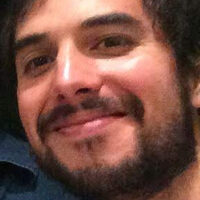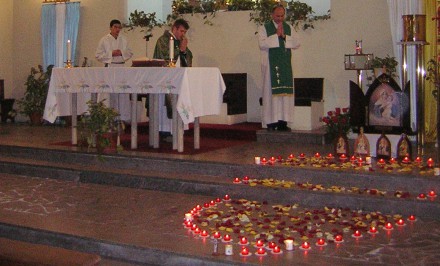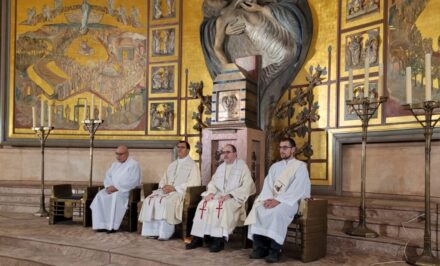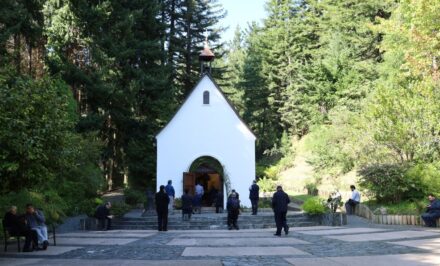Interview with Ignacio Suazo Zepeda on “Our Table: Dialogues for Chile” (NM) •
In the context of the Chilean social crisis, resulting from the social explosion of October 18, and close to initiating a process of approval or rejection of a new constitution for the country, the Catholic University of Chile and the Catholic Voices Foundation have called 60 personalities to talk about the great challenges of these times. This dialogue will take place during three months around nine thematic tables: “the city, poverty and segregation”, “economic and working life”, “integral health and hospitality”, “education and educators”, “the caring of life and creation”, “social structure and coexistence”, “security and human rights”, “family and home” and “the State at the service of people”. The result of this citizen debate will be reflected in a final publication that will be delivered to relevant actors in the Chilean political and social world. —
We talked about this initiative with Ignacio Suazo Zepeda, Master in Sociology of the Catholic University, researcher and in charge of contents of the Non-Governmental Organization (NGO) “Community and Justice”, who participates in the branch of professionals of the sanctuary of Campanario in Santiago de Chile. He has been summoned to this project to work at the “family and home” table. Several members of the Schoenstatt Movement also collaborate in this initiative: Father Francisco Pereira, priest of the Institute of the Fathers and director of Maria Ayuda; Pablo Vidal from the Family Institute and a specialist in sustainability; Francisco Gallegos, professor of Economics at the Catholic University, as well as Carmen Domínguez, from the Family Federation and a lawyer from the UC Center of the Family.
To get started, tell us about this initiative. How does “Our Table: Dialogues for Chile” work?
The project consists of nine tables on nine key dimensions for the achievement of the common good in Chile. The tables are asked to organize themselves and meet at least four times to talk and dialogue, trying to reach a diagnose and one or more proposals for our country, based on our Catholic identity. To facilitate the dialogue, we have a secretary who takes note of our comments and is in charge of collecting the texts that we quote and send. The result should be something simple, no more than a few paragraphs per table.
Although the hosts have provided us with some guidelines and working ideas, the fundamental attitude has always been to give the tables a space for a sincere search for truth and, from there, for the best proposals for the Chile that is coming to us.
One of the purposes of this initiative -in the words of the executive director of Catholic Voices- is to look at our wounds in order to yearn for a more integrated and welcoming Chile. What are those wounds that seem to have broken or damaged the social structure in Chile?
Indeed, that question was the kick-off for our conversation. Now, I can speak from the topic that summons us, which is the “Family and Home” table.
In the first session the recurrent topics appeared: the bad understanding of the family from the public policy, the weakness of the marriage as institution, the difficulties and fears that there are within the Church to speak about the truths in the family, the prevailing anti-birth mentality. But finally, due to the news of the explosive increase of demands for alimony in the context of the withdrawal of 10% of the social security funds, we made the decision to work on an issue that as Schoenstatters we are not at all indifferent to: the paternal absence. We are deeply hurt by the lack of parents who can assume a preponderant role in the family. At the table we came to the conclusion that this absence is at the root of many of the most important problems of the family in today’s Chile.
How can we talk when it seems that we live in times of resentment and anger, when more than a table, there is a swarm of social networks full of noise and shouting, complaints and disqualifications?
Because it would seem that polarization is gaining ground, these instances that promote dialogue are more important. In my experience, the table has been an exemplary case (and why not say it: illustrating) of the potential that we Catholics have to be a contribution to social peace. And it is so because of small attitudes and practices that are very simple, but very powerful. In the first place, because there is love for truth and confidence in the capacity of the human being to know it. This is very important, because at the table we are permanently oriented thinking about the ultimate principles and that, in the long run, allows us to advance in diagnostics. Almost as a consequence of the above: there is “hunger for knowledge”. There is a willingness to listen to us, share texts, review them and integrate them into the discussion. Secondly, we do not start the conversation without first praying. This is also a powerful sign: entrusting the fruits of the discussion to God. This helps to bring us back to the humble place of those who, although they know they are open to reason, are aware of their weakness and understand that they need the illumination of the Holy Spirit to move forward.
“The identity of our country is in its history, in its people and in its values, in these elements a ‘soul of Chile’ is outlined, curdled by the Gospel,” wrote the chaplain of the Catholic University Fernando Valdivieso to explain the meaning of the project. However, for not a few authors (Gonzalo Rojas May, for example) the soul of Chile is sick, since these are times of psychic and civic precariousness. In fact, Chile became the Latin American country with the highest consumption of anxiolytics and antidepressants per capita. What happens in the “soul of Chile”?
The question connects directly with the previous answer, because precisely that which is so properly Catholic, as it is the conjugation between faith and reason, is something that we have painfully been losing as a country. And the fact that Chile is losing its faith progressively is nothing new, since it is enough to see some surveys to notice that religiosity is diminishing in practically all indicators: the number of people who trust the Church, who declare themselves Catholic, who receive sacraments, who attend mass, etc. The point is that a faith that does not allow itself to be made transparent by acts and in concrete persons is being diluted. Thus, it is not surprising that during the last few years we have also been leaving aside our belief in God himself; and this is – in the end – a decline in the number of people capable of trusting in a Provident God.
But what is also very shocking (although in reality, it shouldn’t be) is to think that the loss of faith ends up leading us to the atrophy of reason. More than bad, to undertake a dialogue without the hope of truth or faith that God guides that reflective path is, to say the least, an achievement that will be difficult to accomplish.
Even so, we Catholics continue to be the majority of the population. What happens then? Why are we not capable of unfolding the riches of our faith and putting them at the service of our country? Why does Catholicism not immerse itself in our lives? And I think that at the table we have highlighted some of the deep roots of that. It will be very difficult to do so until there are men who transmit and radiate the authority of God the Father through their own natural authority.
Sociologist Eugenio Tironi has said that one of the reasons for the breakdown of last October 18 is that the traditional institutions of social cohesion – the “social airbags”, he calls them – have expired. Among these airbags he names the family, the nation and religion. In what sense also the crisis of the Church – due to sexual abuse and the politics of cover-up – is responsible for a certain feeling of orphanhood that contributed to the outbreak?
It is difficult to know. The truth is that this is not something we have discussed at the table. In my opinion, the Church’s loss of authority responds to earlier and more profound events. The Church ceased to be an authority and a reference when it stopped giving answers and vital commitments. And that happens when it has stopped being a mother; when it has stopped being a family. It is not very politically correct to say so, but I sincerely believe that, for many, the painful cases of abuse and cover-up only came to confirm and reinforce a previous abandonment of the Church.
Although it may be reckless to say so, I think that this difficulty of the Church in being family is the root cause behind the abuses. In that case, abuse and cover-ups would be symptoms of something much deeper.
Due to the effects of neoliberalism and individualism, not a few Chileans seem to want to move towards a welfare state or one that provides social rights. But this “providential State” can mean an immense, anonymous and impersonal bureaucratic machinery that ends up accentuating an individualism of rights… What does a “State at the service of people” mean?
It is a subject that escapes what we are seeing on the table and that I have not studied so much. But the fundamental challenge of the State is undoubtedly the same as that of the Church: to be family. The State has the potential to make transparent the authority of God the Father and to emulate some of the natural authority of the father. To achieve this, without a doubt, we need to deploy a symbolic dimension that is very difficult for us today: rites (such as military marches), commemorative speeches, gestures, etc. But there is also an operative dimension that must be articulated and developed. I quickly think of things like effective pro-family policies, identifying and putting the poorest at the center (in the sense of having a preferential option for the poorest), strengthening the intermediate bodies and, above all, finding ways to embody the principle of solidarity.
But to move from these broad lines to concrete half-measures and “fundamental attitudes” that feed the politicians called to lead them, is a titanic work.
In this last question we want to return to the “family and home” table. The family seems to be the great forgotten of the right and left public policies in Chile. Incentives to increase the birth rate are scarce and this same institution seems to be blurred by the effects of the laws of recent years that are beginning to take away the authority of parents. The late historian Gonzalo Vial saw in a premonitory way, in 2007, that this crisis of family values and home education, intimately linked to higher levels of delinquency, violence and drug and alcohol consumption, would sooner or later lead to a social explosion. What can the dialogue table and the social doctrine of the Church contribute as a remedy to this crisis of the family?
I think we have commented on all the information that you mention here, so I guess we haven’t done so badly as a family table! Personally, I think that we need to “believe the story”: trust that the Catholic conception of the family, as it is set out in the DSI, allows for the development of effective policies to support families. This is something that has been said by some voices at the table, but which I make my own.
It seems that we Catholics are very afraid to talk about the family – or rather – about its structuring components: marriage and the education of children (and I include myself). But it turns out that the best place for a child to be born is within a healthy and stable marriage. And that is something for which there is much empirical evidence. Recognizing this does not mean looking down on people who for one reason or another are in different family situations, but it is also a problem when we are not clear about what we want to achieve.
It is also a problem when parents give up their role: to be true authorities. And there is much evidence that children do better when their parents manage to combine a “normative” dimension with an “affective” one.
The problem is that many people despair of these things, in the sense that they lose hope of being able to achieve these goods: a marriage for life and the exercise of true authority.
At our table, we decided on and chose a great theme of work, which I think connects directly with the previous reflection: the absence of the father. An absent father is a man who has given up on the two previous roles, that of husband and that of father. This is so frequent in Chile!
It has become commonplace to say that Chile is a patriarchal country. At the table we are convinced that this is a mistake, simply because in most of our country there are no fathers. And probably, except in specific groups and moments, there never have been. In the 19th century already 20-30% of the population was born out of wedlock. Even at the priestly level we lack them: Chile historically has had very few vocations, as Fr. Alberto Hurtado makes clear in his famous “Es Chile un país católico” (It is Chile, a Catholic country). So the question, the distressing question we ask ourselves is how do we promote fatherhood. How do we manage to make Chilean men real fathers? Now, a first light that we have in this respect is that this is a subject that is not very present in the Church, at least in the hierarchy and at the level of the diocesan organization. It is assumed as a fact, not as a theme to be faced pastorally. Perhaps if we manage to find answers from the Church, it will be easier to give answers as Catholics to the country. I believe that, if we manage to articulate and develop this topic well, that of the paternal absence, we can make a good contribution to Chile in this matter.
Interview: Ignacio Serrano del Pozo, Men’s Federation, Schoenstatt.org Columnist, Chile
Original: Spanish 2020-09-11. Translated by Maria Aragón, Monterrey, México.

















